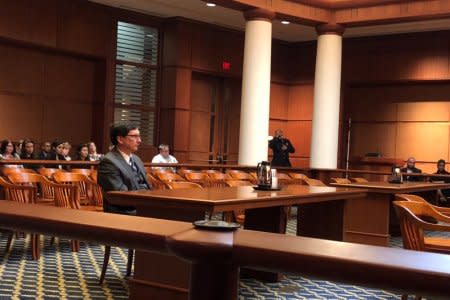Massachusetts court weighs suspending judge for courthouse affair

Thomson Reuters
By Nate Raymond
BOSTON (Reuters) - Massachusetts's top court weighed on Tuesday whether it should suspend a judge who admitted to engaging in repeated sexual encounters including in his courthouse with a social worker whose lawyer contended he abused the power he had over her.
The Massachusetts Supreme Judicial Court considered whether it should take the rare step of indefinitely suspending Judge Thomas Estes without pay, clearing the way for state lawmakers to potentially remove him from office.
The case has evoked the #MeToo movement, which has prompted women to share experiences of sexual abuse and harassment and exposed men accused of misconduct in fields ranging everywhere from entertainment to politics and business.
The case against Estes, who presided over a special drug court in Pittsfield, Massachusetts, followed a complaint last year by social worker Tammy Cagle, who claims the judge pressured her into performing oral sex at his home and in court.
Estes' lawyer, David Hoose, called the harassment allegations "baseless" and contended the judge had engaged in a consensual relationship with Cagle as part of an extramarital affair.
"There have been many sinners in the workplace generally," Hoose told the justices. "He is not first person to have a sexual relationship with a coworker."
But Justice Scott Kafker said that even if Estes' conduct had not directly impacted his decisions in court, his actions had created an appearance of impropriety that left the justices with few options.
"We're left with conduct unbecoming the highest officer of the court," Kafker said. "And it's very difficult to sort of restore him to that position, isn't it?"
Howard Neff, executive director of the Commission on Judicial Conduct, said an "enormous power discrepancy" existed between Estes and Cagle, but that the matter was "not a clear, straightforward case of sexual harassment."
He said Estes' decision to engage in the sexual relationship from November 2016 to March 2017 created an appearance of impropriety, however, and was "so far over the line" that the justices did not need to decide whether he harassed Cagle.
"Judge Estes' conduct unquestionably brought discredit to the administration of justice in Massachusetts," Neff said.
Cagle, who has filed a federal lawsuit against Estes, attended the hearing in person. Her lawyer, Leonard Kesten, told reporters Estes was like other powerful men who seek sexual favors from women in lesser job positions.
"She wanted to be here to show she's not afraid of this man," he said.
(Reporting by Nate Raymond in Boston; Editing by Tom Brown)
See Also:

 Yahoo News
Yahoo News 
